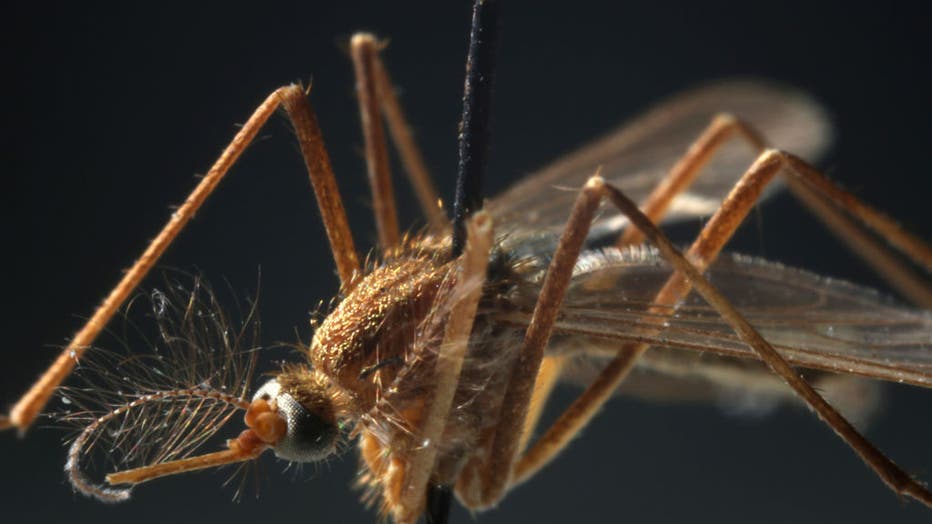West Nile virus: Mosquitoes in Milwaukee County test positive

West Nile virus in mosquitoes in MKE County
Mosquitoes in Milwaukee County have tested positive for West Nile virus.
MILWAUKEE COUNTY, Wis. - Mosquitoes in Milwaukee County have tested positive for West Nile virus.
The Milwaukee Health Department, North Shore Health Department and Wauwatosa Health Department on Friday urged residents to take precautions against mosquito bites.
SIGN UP TODAY: Get daily headlines, breaking news emails from FOX6 News
While no human cases of West Nile virus (WNV) have been reported in Milwaukee County in 2024, there have been confirmed cases in both people and animals elsewhere in Wisconsin.
According to the Milwaukee Health Department, WNV is transmitted to humans and other animals through the bite of an infected mosquito, which acquires the virus by feeding on infected birds. The virus does not spread directly between people, animals, or from animals to humans.

A Culex pipien mosquito specimen in the insect collection at the Field Museum shows the type of mosquito that carries the West Nile virus. (E. Jason Wambsgans/Chicago Tribune/Tribune News Service via Getty Images)
Most people infected with WNV (about 80%) do not develop symptoms. Health officials said those who do may experience mild symptoms such as fever, headache, muscle aches, rash and fatigue.
However, in rare cases (less than 1%), the virus can cause severe illness with symptoms that include high fever, muscle weakness, stiff neck, disorientation, confusion, tremors, paralysis, and coma.
FREE DOWNLOAD: Get breaking news alerts in the FOX6 News app for iOS or Android.
Older adults and those with compromised immune systems are at a higher risk of developing serious, potentially fatal complications. Anyone who suspects they may have WNV should contact a health care provider promptly.
Wisconsin public health officials have monitored the spread of WNV since 2001, with an average of 18 cases reported annually. Human WNV infections have been documented from June through October, with the majority of cases occurring in August and September.
To minimize the risk of WNV and other mosquito-borne illnesses, the best course of action is to reduce exposure to mosquitoes and eliminate breeding sites. Mosquito activity, and the associated risk of WNV, will persist throughout the summer until a hard frost (temperatures below 28°F for at least four consecutive hours) happens.
Local health departments recommend the following tips to protect yourself and your family:
Avoid Mosquito Bites
- Apply insect repellent containing DEET, picaridin, oil of lemon eucalyptus, or IR3535 to exposed skin and clothing.
- Treat clothing with permethrin before going outdoors; avoid applying permethrin directly to your skin.
- Consider rescheduling outdoor activities during the evening or early morning hours when mosquitoes are most active.
- Wear long sleeves, long pants, and socks to reduce skin exposure.
Mosquito-Proof Your Home
- Prevent mosquito breeding by removing stagnant water from your property.Empty standing water from containers, flower pots, tires, gutters, and downspouts.Turn over wheelbarrows, kiddie pools, buckets, and small boats when not in use.Change the water in bird baths and pet dishes at least every three days.Clean and chlorinate swimming pools, saunas, and hot tubs; drain water from pool covers.
- Empty standing water from containers, flower pots, tires, gutters, and downspouts.
- Turn over wheelbarrows, kiddie pools, buckets, and small boats when not in use.
- Change the water in bird baths and pet dishes at least every three days.
- Clean and chlorinate swimming pools, saunas, and hot tubs; drain water from pool covers.
- Ensure window and door screens are intact and securely fitted to keep mosquitoes out.
- Trim or mow tall grass, weeds, and vines, as mosquitoes rest in these areas during the day.


